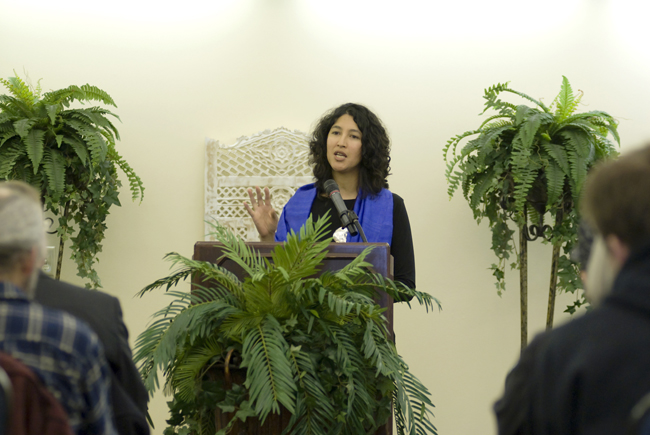South African poet reads her work to students
More than 100 students, faculty and staff crowded into the Haight Alumni Center Monday to hear South African poet Gabeba Baderoon in the Department of English Speakers Series.
Shane Graham, assistant professor of English and scholar of South African literature introduced Baderoon. Graham explained how apartheid had monopolized the subject of South African poetry for almost half a century. After the abolition of apartheid in the mid 1990s, “Gabeba Baderoon was one of the first to ask the question, ‘What do we write about now?'” Graham said.
“I have been shaped in my consciousness by a country of agonies.” Baderoon said in her introduction. “I needed to know, when our literature had been so shaped by this history of resistance, was there a way we could write about the fuller parts of our lives?”
With degrees in English, psychology and media studies from the University of Cape Town, Baderoon’s narrative poems emphasize the importance of human love and examined the idiosyncrasies of communication. Baderoon began with a poem entitled “Beginning.”
Her next poem, “Hunger,” started with the line, “All day I watch the cooking shows, perhaps for the company of color.” Baderoon then said, “I actually started writing poetry when I left South Africa and started a fellowship in the United States.” She described how isolated she felt, separated from her people, the mountains and her family. Television broadcasts of the crumbling apartheid regime drew the attention of her collegues Boderoon said.
“Often there were images more violent than cooking shows … suddenly we were all watching the same story,” she said.
With each poem Baderoon drew the audience further into a world of methodical disclosure and tenderly dissected emotion. In the poem “Witness” an aquaintance of her husband knocks on their door, explains he was pulled over for DUI and asks for a reference. Baderoon overhears the conversation.
“From the passage I learn what men give each other, silence on which to lean their bodies against.” In “War Triptych” a father’s son is killed in the intifada. “He felt a hand slip from his hand, and for this refused the solace of glory.”
Baderoon said in writing about such intimate subjects she “didn’t want to depict someone else’s pain as an object of consumption. But I’m still leaning where poetry goes, and where it can’t go.”
“I forgot to look,” she said as she talked about her mother. “She went to the university 30 years before I did, at a time when that wasn’t supposed to be possible.”
Her mother, she said, was escorted out of the classroom with the other non-white students when a Caucasian cadaver was brought in for autopsy. They filed by the desks of the white students, not meant to see “under the skin, the mystery of sameness.”
Baderoon finished with “The Pen.”
“Three days before my father dies I lost the silver pen.” She had been cleaning his garage. “When I went home late that day I negotiated with loss, as I always do not going back to the garage in case the pen wasn’t there … The night he died I felt a completeness of loss, an absence without negotiation.”
When Graham opened up the floor to questions the audience sat, in silence. Baderoon broke the tension explaining, “Sometimes the effect of the poems causes you not to speak.”
–benabbott@aggiemail.usu.edu

